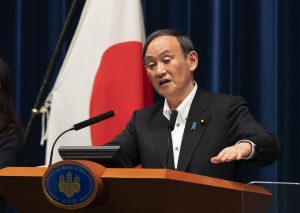The Biden administration has been emphasizing its relationships with allies and has taken a number of opportunities to highlight the importance of ties between Japan, the U.S. and South Korea in dealing with the issues of China and North Korea.
Meanwhile, since the end of 2020, South Korea’s Moon Jae-in administration has sent a number of signals to Japan indicating a desire to improve bilateral relations. Indeed, South Korea has recently adopted policies that could be seen as concessions towards Japan, even on matters related to historical issues.
But the Japanese government does not appear to be actively responding or expressing a willingness to set about improving relations with South Korea. Although there are likely negotiations going on behind the scenes, publicly at least, we have not seen any move to bolster ties. There is no shortage of observers within Japan who believe that it is worth improving relations with South Korea from a long-term, geopolitical standpoint, lingering concerns notwithstanding. But the government of Suga Yoshihide seems strangely reluctant to do this. Why?
The first explanation, and something that is easy to imagine, is that Suga himself, who served as chief cabinet secretary during the Abe Shinzo administration, together with core figures in his administration, may have trouble trusting South Korea. Although the Abe administration reached an agreement with the Park Geun-hye administration on the comfort women issue at the end of 2015, when he took office Moon made it clear that the agreement would not be honored. Subsequently, court cases were filed against Japanese companies for their actions before the Second World War.
The second possible explanation is Moon’s term of office. Moon has less than a year of his term left. Japan has already seen promises made at the end of one administration being reversed by the next, and it may be that Suga, who was a member of the cabinet when that actually happened to the Abe administration, is reluctant to respond to any overtures towards the end of the Moon administration, even given pressure to do so from Washington.
The third explanation may involve Japan’s feelings toward South Korea. While Japan has warmer sentiment towards South Korea than it does toward China, there are still many Japanese who harbor strongly negative views. That is borne out in every public opinion poll. Moreover, a survey conducted by Japan’s independent think tank Genron NPO revealed that, while the Japanese public has decidedly negative feelings towards China, even in the age of COVID-19 more than six in every ten Japanese believe that relations between Japan and China are important. However, not even half felt that way about relations with South Korea. Suga faces Lower House elections this year. For his administration, facing low approval ratings due to its handling of COVID-19 and the Olympics, providing easy concessions to South Korea poses a risk, and it could even be fatal to his government were it to find compromise with South Korea and then see the concessions it made reversed or altered down the road.
Even in Japan, there is broad recognition that its diplomatic importance to South Korean has declined considerably. At the same time, Japanese society and the ranks of the Japanese government has become quite distrustful of South Korea under the Moon administration. In other words, there is an ingrained skepticism that even if Tokyo were to negotiate and hammer out some sort of agreement, it could all be undone with a change of administration.
There are those within South Korea questioning why Japan is not responding to the signals from Seoul. Certainly, relations between Japan and South Korea are crucial for both geopolitical and strategic reasons. But for the Japanese government at least, it may be difficult to move forward without at least some rebuilding of trust around the 2015 Comfort Women Agreement and subsequent events. The governments of both countries need at this point to take steps to reach a mutual understanding, and move to long-term perspectives, ideas and decisions.
The North Korea issue was raised at the Meeting of G7 Foreign and Development Ministers held in early May and during the Japan-U.S. Foreign Ministers’ Meeting, underscoring the importance of coordination between Japan, the U.S. and South Korea. Whether this will spur Japan to finally act remains a question.

































